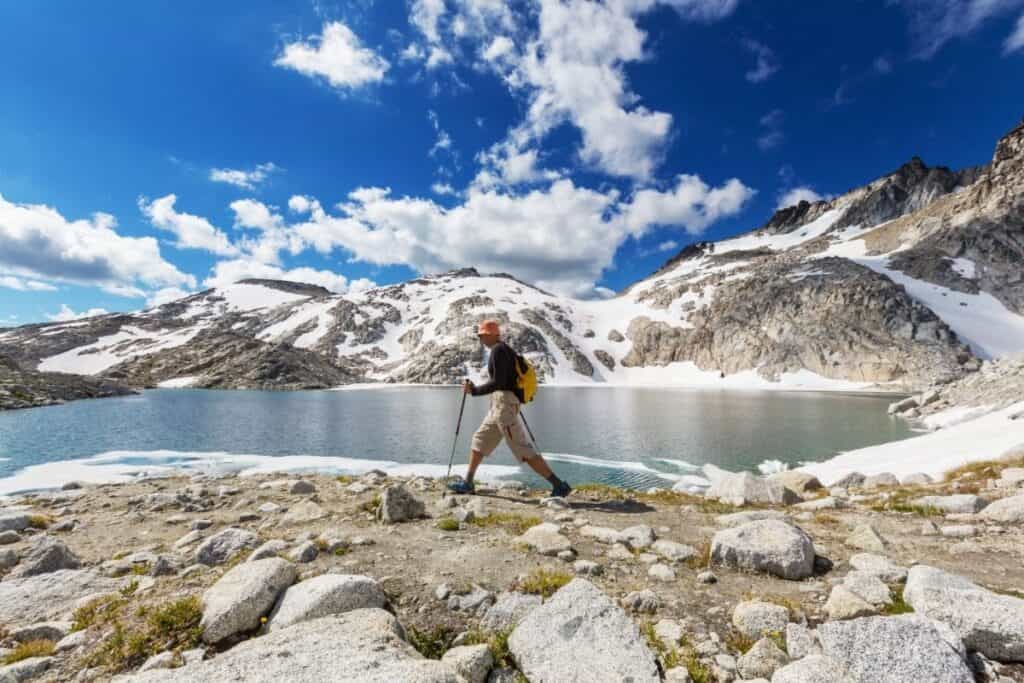
Hiking is an outdoor activity that is enjoyed by many people all over the world. The activity can improve your health, keep you in a good mood, and bring you closer to the Earth. Hiking can be used as a physical exercise or even a spiritual one.
Walking, in general, is excellent for the body and the heart. However, while taking a regular walk can be good for you, there is a difference between a walk and a hike. But what is the difference?
Hiking involves long walks in the outdoors, typically on dirt or other unfinished paths. Compared to walking, it is a more taxing form of activity that often includes climbing hills or mountains.
While that provides a brief definition, let’s take a look at some of these differences in more detail!
What Is the Difference Between a Walk and a Hike?
The biggest differences between a walk and a hike are the environment in which someone is traveling and the length of time.
The Environment
Those who go on walks tend to take their walks in more local areas. These areas are often within the town or the general public. If you are taking a walk, you are likely to encounter another person going about their day.
Typically, walks are fairly low-effort. You can walk for a long time, but the area in which you are walking is likely going to be very flat and easy to walk through.
Hikes are also taken outside, although hikers typically walk on dirt and rundown trails through forests or areas away from the general public. Hiking can be much more intense, as there is likely to be jumping and climbing involved.
Many people use hiking as a way to explore new areas or to get in touch with the earth. The idea of connecting with the environment is an appealing idea to many.
Hiking is often considered to be more therapeutic than a standard walk because it allows you to unwind in the peaceful setting.
The Length of Time
When someone takes a walk, their walking time is typically much shorter than those who go for hikes. Hiking trips can last for hours, and hikers can travel miles in their trips. Many hikers will set goals for themselves to see how far they can travel.
Hiking will usually require supplies, as hikers can be away from home for hours and even days. A standard walk can be achieved with little more than water. But for hiking, it is recommended that you have enough food and water to replenish yourself frequently.
Hiking can also turn into multi-day trips, whereas a walk will usually be done within the day. These multi-day hiking trips could range anywhere from several days to several months!

What Qualifies as Hiking?
Hiking is defined as “the activity of going for long walks in the country for pleasure.”
However, most hikers agree that there is more to hiking than simply walking in the countryside. There are varying factors in what makes a proper hike.
Distance
Those who hike as opposed to walking typically cover much more ground.
Hikes can last for hours and can even extend into camping trips. Professional hikers can cover up to 30 miles of ground in a day! Even those who are just beginning to hike can cover up to ten miles in a day if they’re fit.
Sometimes hikes will cover many miles, but that’s not always the case. There are times that hikes have an end destination.
Other times, hiking trips are more about exploring the scenery!
Environment
While not true in every case, most of the time, hikes are taken in areas that are away from the public. Countrysides, mountains, deserts, forests, and even abandoned areas are all subject to hikers.
You are not very likely to run into someone else during a hike than you would be while taking a walk.
Popular hiking spots will usually have trails that have been worn down by people continually walking the same path. Depending on the area, trails can either be well defined or barely visible.
High Effort
Hikes not only entail long distances, but they often lead to quite a workout.
Depending on the terrain, hikers will have to climb, jump, crawl, and maneuver their way through their path. These hikes can lead to a lot of calories being burned, and it is important that hikers carry proper supplies to replenish themselves.
The effort that is required in a hike is one of the biggest reasons people enjoy hiking. Hiking allows you to observe and explore the scenery around you while also providing a great workout.
Etiquette
Even though the rules of hiking are relatively relaxed, there is a sort of etiquette among the hiking community.
Experienced hikers are inclined to be more careful of the environment they are exploring and make an effort to preserve nature. Experienced hikers are also more aware of how they impact their surroundings and are careful not to leave any litter.
It is often considered good etiquette to keep your surroundings clean and clean up any mess that may have been discarded by others if you see it.
What Distance is Considered a Hike?
While the goal for most hikers is to travel a great distance on foot, there is no set distance that must be traveled in order to call the trip a hike.
It is hard to put a minimum requirement on what defines a hike, as the distance a person can travel depends on their physical health and environment. An environment that requires a lot of climbing is more likely to wear someone out faster than a simple trail in the woods.
Because of this, the distance covered by hikers is more often personal goals that have been set. These personal goals can range from traveling one mile in a day to thirty miles in one day.
Personal goals can also include discovering new places and reaching a specific destination. These destinations can require ten miles of travel or just one mile. Because of this, it is hard to put a minimum requirement on what is considered hiking.
How Is Hiking Good for You?
Hiking is good for the body for a multitude of reasons that often vary from person to person.
For the majority of the population, hiking can help improve cardiovascular health. The amount of walking done during a hike can help improve blood pressure and lower the risk of heart disease.
Hiking can also build muscles in the legs, hips, and glutes. Hiking can also strengthen the core muscles, which can help improve balance.
Because of the extended walking and climbing, hiking is also a safe and effective method for weight loss. However, make sure that you consume enough calories to fuel your body for extensive traveling if you are using hiking as a way to lose weight. It is easy to succumb to exhaustion if you are not careful.
Apart from improving physical health, hiking can also have a good impact on mental health. Many hikers enjoy hiking as it allows them to isolate themselves from stressful situations in their lives. Hiking also provides people the opportunity to connect to nature.
Hiking can also improve the overall mood, and many hikers use their trips as a form of therapy.
Final Verdict
Overall, a hike is an extended and more vigorous form of a walk. Hikes tend to be much longer and in a more challenging environment than a typical park or backyard.
There is a very active community involving the people who hike frequently. There are professional hikers who travel miles, regardless of the season. There are beginner hikers who are aiming to travel at least one mile a day.
It is not about how far you can travel. Hiking is much more about the journey and less about the destination.
Related Articles
If you found this article helpful, then make sure to also take a look at my other related articles!
